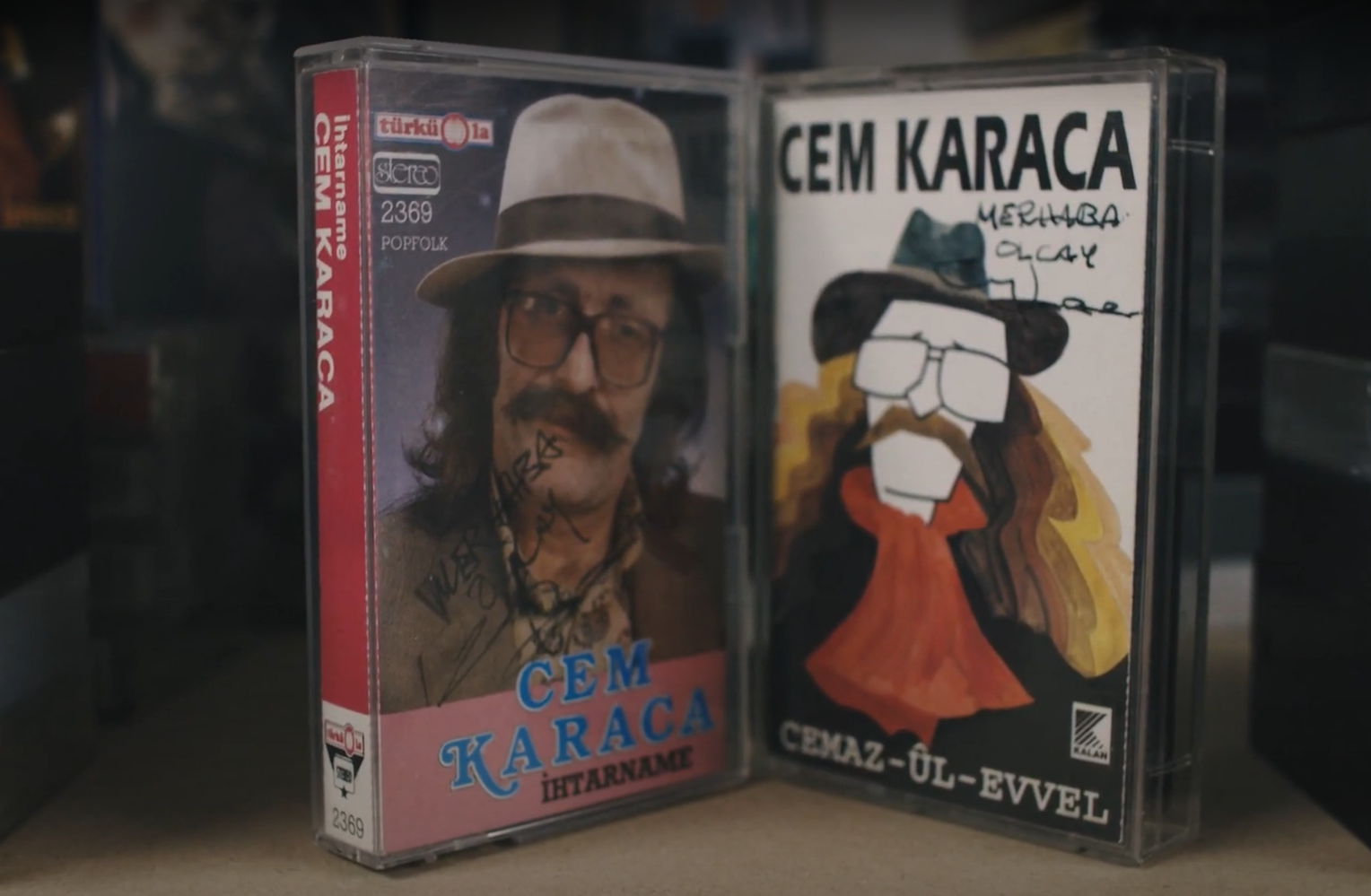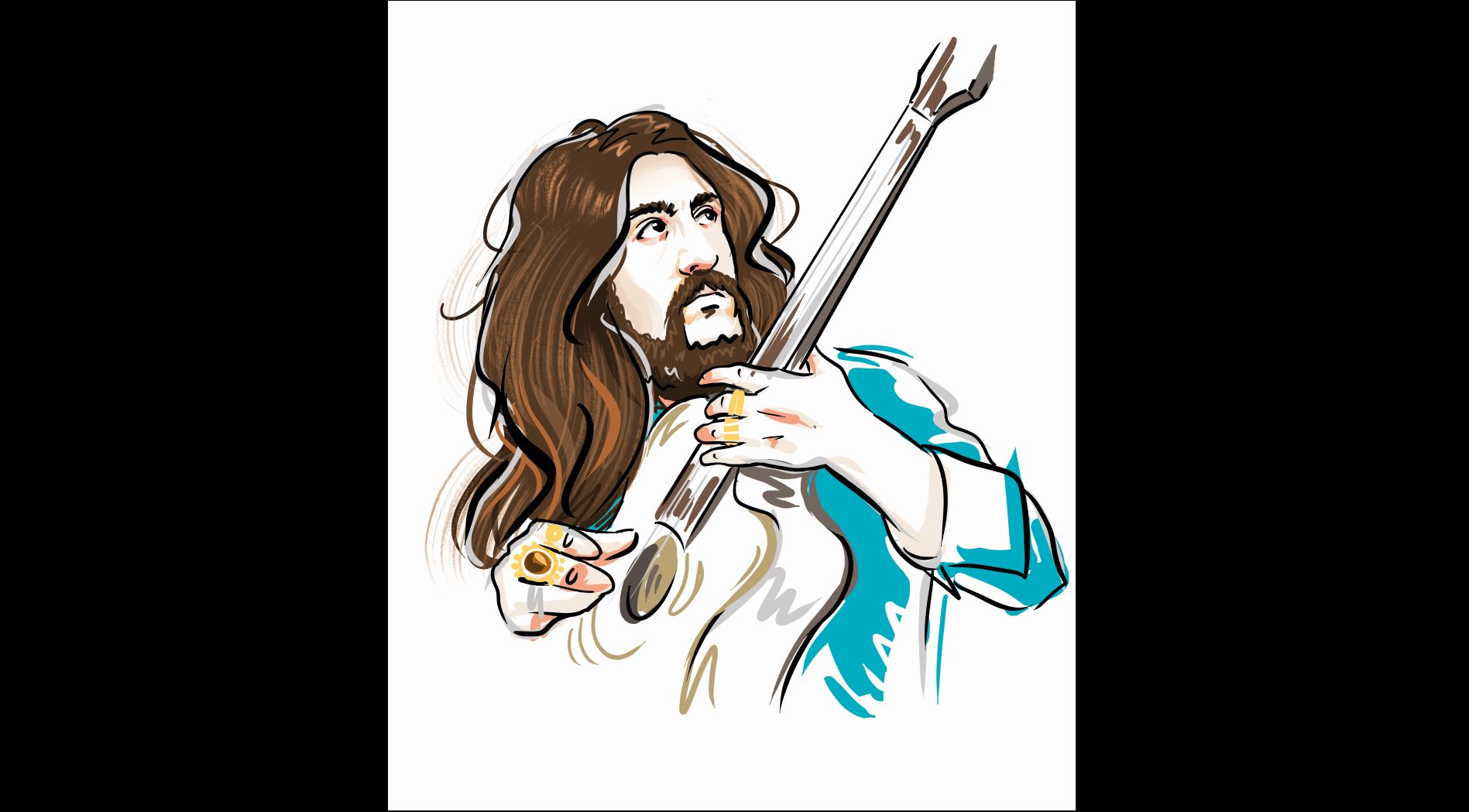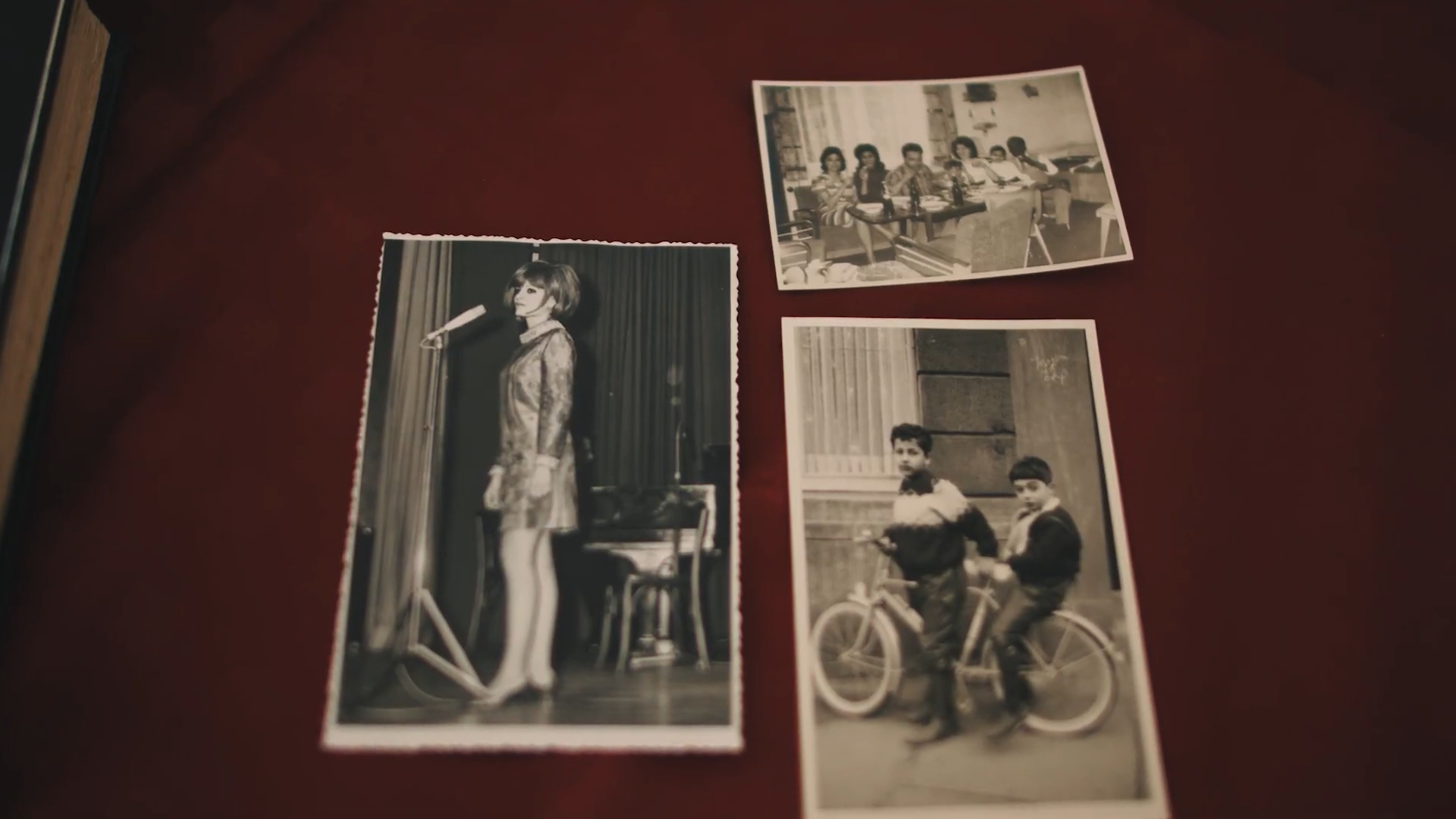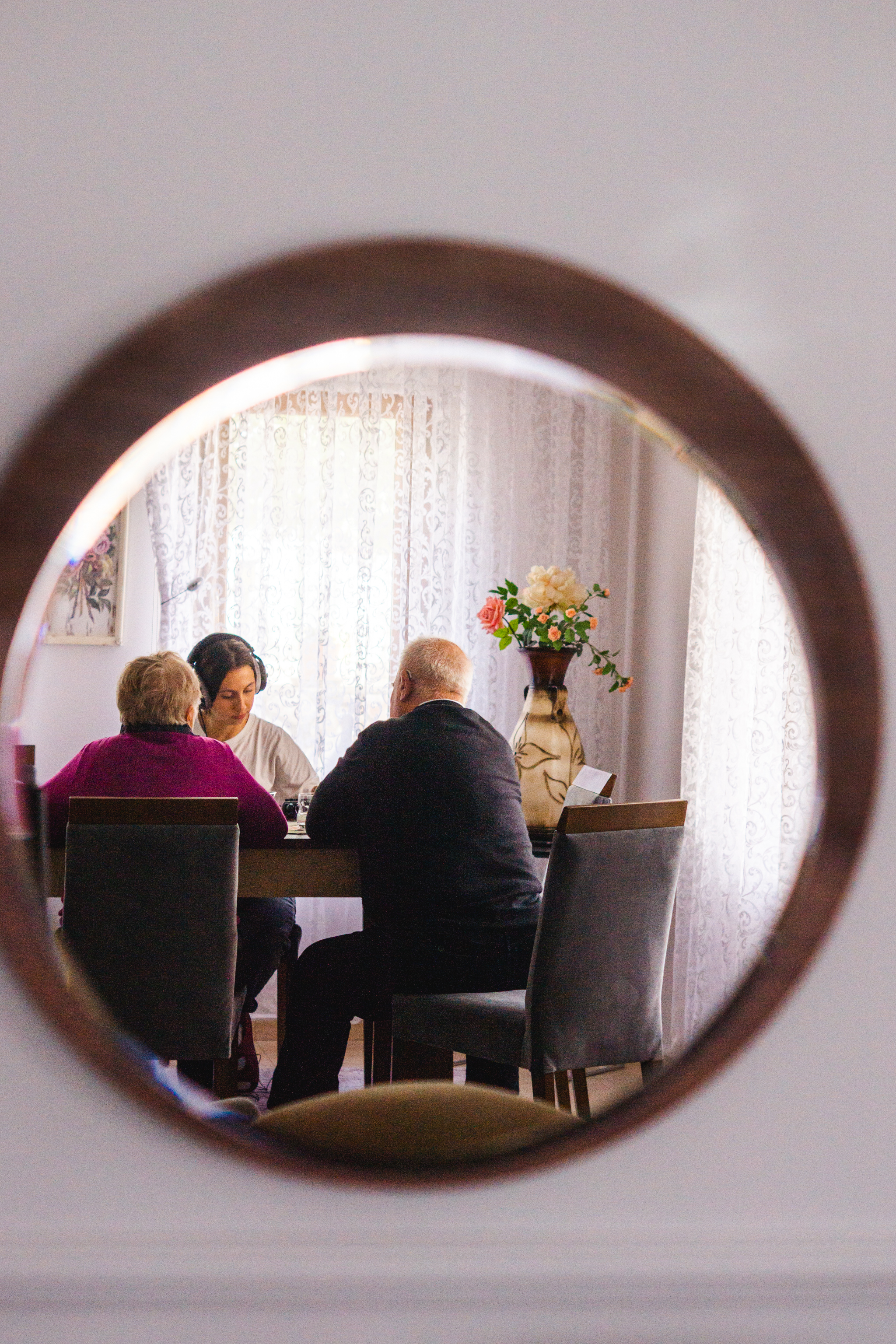en
- de
- en
The 1980s were dominated by political movements that had their roots in 1968. Fear of environmental destruction and the nuclear arms race was omnipresent, culminating in the Chernobyl nuclear disaster in 1986. Meanwhile, hairdryers, shoulder pads, bell-bottoms and neon colours dominated the cityscape. With the coup in Turkey in 1980, many people fled to Germany for political reasons, including one of Turkey's most important rock voices: Cem Karaca. The "Gurbet Türküleri", the folk songs from a foreign land as a new genre, were gradually joined by a variety of new music genres, such as rock, hip-hop and pop, which were in tune with the times.
Many guest workers in Germany came from rural areas in Turkey and feared a social decline due to the new migrants who were now fleeing from the cities to Germany; they were politically and often more educated than the first guest workers.
"PEOPLE ARRIVED"
One of these "new Turks" was Cem Karaca, who now also sang in German. The song lyrics were often a mouthpiece for the political views of the musicians. With the increasing xenophobia in the Federal Republic of Germany, the topic of racism increasingly became the focus of the song narratives of people of Turkish origin
Immerse yourself in historical images of the 1980s from the WDR archive and listen to Cem Karaca sing: "People arrived".
CEM KARACA - IN GERMAN AGAINST RACISM
A well-known voice of Anadolu Rock (a unique fusion of Western rock and traditional Turkish folk music) was Cem Karaca, born in Istanbul in 1945. His biography is one of political exile: after the military coup in Turkey in 1980, he was accused of inciting the people because of his music lyrics, which is why he was expatriated. Karaca fled to Germany and began to sing in German as well. In his album "Die Kanaken" (The Kanaks), released in 1984, he addressed the precarious situation of many guest workers and the increasing racism against people of Turkish origin in Germany.
Cem Karaca
"PEOPLE ARRIVED"
Workers were called
but people arrived
Workers were called
but people arrived
Our labour was needed
the force that creates something on the assembly line
We humans were not interesting
that's why we remained unknown to you
Ramaramaramaramadah
Guest workers
Ramaramaramaramadah
Guest workers
Workers were called
but people arrived
Workers were called
but people arrived
As long as there was a lot of work
the dirty work was handed over to us
But then when the big crisis came
they said we are to blame
You do not want our culture
nor to be with us, you only want to
see us as strangers so we remain
strangers there as here.
Workers were called
but people arrived
Workers were called
BARIŞ MANÇO - PIONEER OF ANADOLU ROCK
He really is the greatest over there - nobody knows him here, said Alfred Biolek in October 1982 when he introduced Barış Manço to his viewers in the programme "Bios Bahnhof". It was an unforgettable moment for the 1.5 million Turkish-speaking people in Germany to see the Turkish superstar in prime time on ARD. Barış Manço, born in Istanbul in 1943, was one of the most important artists in Turkish music history. His trademark was his long hair, moustache and hippie style of dress. Manço became famous alongside Karaca as a pioneer of Anadolu Rock. Although he never lived in Germany, he was an important voice politically and musically for the vast majority of migrants from Turkey.
The versatile artist varied his musical style again and again and also sang in English. In addition to his great successes in Turkey, he made his breakthrough in the international music charts as early as the 1970s and became known worldwide. His single "Nick the Chopper", released in 1976, spent four weeks at number one in the UK. Outside Turkey, he had his biggest fan base in Japan. In addition to his music, Manço campaigned for socio-political issues such as environmental protection and love of animals and composed children's songs to instil in them a love of animals. The song "Arkadaşım Eşek" ("My Friend the Donkey") is still considered one of the most popular children's songs in Turkey. On 31 January 1999, Barış Manço died of a heart attack. He received a state funeral, accompanied by millions of fans.
HELMUT KOHL AND ALSO STRAUSS, WANT FOREIGNERS OUT, DEAR GABI
Likewise, many people became estranged from their old "homeland" Turkey as early as the 1980s. For example, the duo "Derdiyoklar" sings in a song: "Helmut diyor pis yabancı, Tuğrul diyor Alamancı" (Helmut calls him dirty foreigner, Tuğrul calls him German). The dilemma of being caught between two supposedly opposing cultural identities is increasingly becoming the subject of Gurbet Şarkıları (Songs from a foreign land ).
In this song "Liebe Gabi", the duo Ali Ekber Aydoğan and İhsan Güvercin sing about their problems in Germany and address a fictitious Gabi, who is supposed to symbolise Germany; for example when they sing:
Helmut Kohl and also Strauß, dear Gabi / Want foreigners out, dear Gabi / Are we not human, dear Gabi?
Derdiyoklar
"DEAR GABI"
Komm zu mir gel yanıma le le liebe Gabi
Etwas derdim var su diye le le liebe Gabi
Dert anlatmak zor kötüye le le liebe Gabi
Bilerek yaşamak varken le le liebe Gabi
Helmut Kohl und auch Strauss le le liebe Gabi
Wollen ausländer raus le le liebe Gabi
Bizler insan değil miyiz le le liebe Gabi
Severek yaşamak varken le le liebe Gabi
Şimdi birde vize cıktı le le liebe Gabi
Nice gönülleri yıktı le le liebe Gabi
Gurbetçiler dertten bıktı le le liebe Gabi
Gülerek yaşamak varken le le liebe Gabi
Derdiyoklar böyle gitmez le le liebe Gabi
Almanya'da baskı bitmez le le liebe Gabi
İch liebe dich demek yetmez le le liebe Gabi
Ölerek yaşamak varken le le liebe Gabi
OZAN ATA CANANI "GERMAN FRIENDS"
Ozan Ata Canani, born in 1963 in Maraş (Turkey), is a German-Turkish musician who came to Germany at the age of 12. Three years later, he began to deal with problems and worries in foreign countries in German and Turkish lyrics.
They call us guest workers and the children of these people are divided into two worlds, I am Ata and I ask you where do we belong now? In his song Deutsche Freunde (German Friends) from 1978, Ozan Ata Canani writes and sings for the "dirt and rubbish workers, steel construction and railway workers" from his generation and wants to address the German public.
A MESSAGE TO GERMAN POLITICIANS
In the film "Sounds from the Soul", Ozan Ata Canani talks about his song "German Friends" and what message he wanted to convey to German politicians with it. It is only several decades after the original release that his song is recorded again and is more important today than ever as a historical testimony to the times.
Ozan Ata Canani
DEUTSCHE FREUNDE (GERMAN FRIENDS)
Workforce was called
Our German friends
But people came
Our German friends
Not machines but people
But people came
Our German friends,
Friends, friends,
the have joy in life
From Turkey, from Italy,
from Portugal, Spain
Greece, Yugoslavia,
Did people come here
Our German friends
Do people come here
Our German friends,
Friends, friends,
They have joy in life
As a welder, as a labourer
As dirt and rubbish workers
Steel construction and assembly line workers
They call us guest workers
Our German friends
They call us guest workers
Our German friends,
Friends, friends,
They have joy in life
And the children of those people
Are divided into two worlds
I am Ata and I ask you
Where we belong now
Our German friends
I am Ata and I ask you
Where we belong now
Our German friends,
Friends, friends,
You have joy in life
THE "NEW TURKS" AND THEIR PATHS TO GERMANY - PERSONAL OPINIONS
While in the first two decades of labour migration to Germany most of the guest workers came from the rural population in Turkey, other population groups increasingly followed in the wake of the military coup and the political upheavals in Turkey: People who were persecuted because of their political and/or religious convictions as well as their ethnic origin. Many politically persecuted Kurds, Alevis, opposition activists, artists and musicians came to Germany, who were no longer classic "guest workers".
In the following interview excerpts you can hear some personal voices on this.
MUHARREM DOĞAN - POLITICAL PERSECUTION AT HOME
Muharrem Dogan comes from the city of Malatya. He is a Kurdish Alevi. As a child, he fell in love with the saz. As his father was against it, he secretly bought his first instrument at the age of 12 and started playing the saz. In 1982, he emigrated to Germany for political reasons and has been politically and socially active ever since. Today, Muharrem Dogan lives with his family in Bonn. He gives saz lessons in various Alevi associations, composes music and plays different types of saz, such as tenbur, oud and meydan, at events.
MUHARREM DOĞAN - FALLING IN LOVE WITH THE SAZ
SAVAŞ ANUL - ARRIVAL IN GERMANY
Savaş Anul is now 50 years old and lives with his family in a town near Hanau. Although he was born in Frankfurt am Main, he grew up in Turkey with his grandparents until 1980. His family comes from Balıkesir in western Turkey. Today he is a member of the Alevi community in Hanau, where he and his wife were also involved as board members for a time. In his congregation, he takes on the task of the zakir, i.e. the person who helps to organise the service musically on the saz.
SAVAŞ ANUL - A CHILDHOOD IN TURKEY
MORE STORIES ABOUT GURBET ŞARKILARI - SONGS FROM A FOREIGN LAND
FROM THE "FOREIGN" INTO THE MAINSTREAM
The preoccupation with one's own identity is becoming increasingly important in many migrant biographies and is reflected in many songs. At the same time, it can be observed that the musicians increasingly choose the German language to express their thoughts and feelings.
FROM FEATHER BEDS TO STRAW - THE LONGING BEGINS
The first guest workers from Turkey come to Germany and a longing journey begins.
Podcasts as a place of remembrance
Funded by KULTUR.GEMEINSCHAFTEN, "Erinnerungenschaften - der Podcast für türkisch-deutsches Erinnern" preserves post-migrant voices and allows people to speak who have experienced and shaped our common history.





